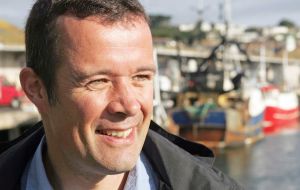MercoPress. South Atlantic News Agency
ASC and MSC release joint seaweed standard; US$ 5.6bn global business
 Chris Ninnes, ASC CEO: seaweed is an increasingly important commodity globally and a standard to promote best practices, helps to limit the ecological impact
Chris Ninnes, ASC CEO: seaweed is an increasingly important commodity globally and a standard to promote best practices, helps to limit the ecological impact  “Seaweed is found in a wide range of products, including food, cosmetics, medicines and fertilizers” said Rupert Howes, CEO of the MSC.
“Seaweed is found in a wide range of products, including food, cosmetics, medicines and fertilizers” said Rupert Howes, CEO of the MSC.  Over 3,700 companies worldwide now have MSC Chain of Custody certification, operating in over 42,000 sites across the world.
Over 3,700 companies worldwide now have MSC Chain of Custody certification, operating in over 42,000 sites across the world. The Marine Stewardship Council (MSC) and the Aquaculture Stewardship Council (ASC) announced the launch of the ASC-MSC Seaweed Standard. The joint standard marks a first for the two certification programmes, bringing together expertise in sustainable fishing and responsible aquaculture.
Building on each other’s expertise in standard setting and seafood certification, the ASC and MSC have worked together for over two years to develop a standard for environmentally sustainable and socially responsible farming and wild harvest of seaweed. The new standard will help to protect marine environments and secure the livelihoods of those who depend on them by recognising and rewarding sustainable and socially responsible seaweed production.
“I am delighted to see ASC’s and MSC’s hard work, collective effort and close collaboration on our first joint standard coming to fruition,” said Chris Ninnes, CEO of the ASC. “Seaweed is an increasingly important commodity globally. The creation of a standard to promote best practices by the sector is an important step towards limiting its ecological impact and ensuring that workers and communities benefit from its rapid growth. I look forward to working together with the MSC to make our joint standard a success.”
“Seaweed is found in a wide range of products, including food, cosmetics, medicines and fertilizers. It is a valuable resource for coastal communities and supports a growing global industry,” said Rupert Howes, CEO of the MSC. “Seaweed also absorbs significant amounts of CO2 helping to regulate our climate, provides important habitats and protects coastlines from erosion. It is therefore essential that seaweed is harvested in a way that allows both communities and the environment to thrive. The new standard offers responsible seaweed producers an opportunity to earn international recognition for their efforts.”
The ASC-MSC Seaweed standard focuses on minimising the environmental and social impacts of seaweed operations. Environmentally, seaweed operations must show that they maintain sustainable wild populations and actively minimise their impact on the surrounding natural environment. Socially, the operations must be managed in an effective and socially responsible manner, care for their employees, work with the local community, and be good and conscientious neighbours.
The standard establishes a robust and efficient framework to certify seaweed through scientific understanding and industry best practices. It is applicable to both global wild harvest and aquaculture seaweed operations of all sizes. The standard also provides a tool to benchmark best practice and incentivises improvements.
Seaweed operations that seek certification are assessed according to a third-party verification system. Qualified independent certifiers audit seaweed producers to up to 33 performance indicators. The ASC-MSC Seaweed Standard will use the existing MSC Chain of Custody Standard to ensure that effective traceability systems are in place throughout the supply chain.
Chain of Custody certification assures consumers that MSC or ASC labelled products have been sourced legally from a certified sustainable and responsible source. Over 3,700 companies worldwide now have MSC Chain of Custody certification, operating in over 42,000 sites across the world. Over 1,300 companies have added ASC certified species to their business in 66 countries globally.
According to the United Nations Food and Agriculture Organisation (FAO, 2014), about 25 million tonnes of seaweeds and other algae are harvested annually with an estimated total annual value of US$5.65 billion.




Top Comments
Disclaimer & comment rulesCommenting for this story is now closed.
If you have a Facebook account, become a fan and comment on our Facebook Page!